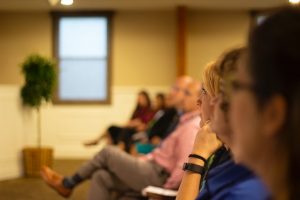 EG writes: "I am willing to accept that the 12 step programs are new age with the "God as you understand him" placed in the steps. My husband got over an addiction to alcohol in 1981 through Alcoholic Anonymous and remained sober till his death in 1998....One of the things I have noticed is that the program members are getting involved in the "Course in Miracles", and I know of members who are starting Self Help Seminar programs that are using some AA materials but without "that god stuff". Could I get some clarification on this as I find it confusing."
EG writes: "I am willing to accept that the 12 step programs are new age with the "God as you understand him" placed in the steps. My husband got over an addiction to alcohol in 1981 through Alcoholic Anonymous and remained sober till his death in 1998....One of the things I have noticed is that the program members are getting involved in the "Course in Miracles", and I know of members who are starting Self Help Seminar programs that are using some AA materials but without "that god stuff". Could I get some clarification on this as I find it confusing." A lot of controversy surrounds 12 step program such as Alcoholics Anonymous (AA) because of it's emphasis on an unnamed "higher power," which leaves the door wide open to New Agers who have turned this ambiguousness into an "invent-a-god" concept that is a perfect fit for their esoteric ideology.
But this is a very complex subject and I won't attempt to cover it all in a blog. However, I can point you to this very thoroughly written article, entitled "Catholicity of 12 Step Programs" which appeared in the October, 1996 issue of This Rock.
Essentially, Alcoholics Anonymous (AA) and dozens of other 12-step self-help programs are modeled on an early twentieth century movement known as the Oxford Group (not to be mistaken for the Oxford Movement). It was founded on a belief in the necessity of personal conversion, a transforming spiritual experience, and restitution. It incorporates 12 steps including admitting powerlessness over the addiction and the need of a "higher power" to taking a moral inventory of our behavior and making restitution to those we have injured. Alcoholics used this movement, which sought to practice "original Christianity," to become sober. After just a few years, they broke away from the Oxford Group to focus more on helping alcoholics recover.
The two co-founders of the original AA, Bill Wilson and Dr. Bob Smith, retained much of the vision of the Oxford Group and were heavily influenced by Catholic theology. The original AA is fundamentally theistic which poses a problem for New Agers who believe in self liberation of the "god within" through either esoteric knowledge, one's own power - or both. They also don't believe in sin, only in one's ignorance of their own divinity. Where AA speaks of growing in the image and likeness of God, New Agers are more interested in becoming God.
 Over time, New Agers in the burgeoning recovery and self-help movement have managed to refashion these programs into something that better fits their ideology. As EG states in her email, some members are drifting into A Course in Miracles, which is a program designed to reorient a person from a Judeo-Christian to a New Age worldview, while others are becoming involved in AA spin-offs that are stripped of any biblical understanding of God.
Over time, New Agers in the burgeoning recovery and self-help movement have managed to refashion these programs into something that better fits their ideology. As EG states in her email, some members are drifting into A Course in Miracles, which is a program designed to reorient a person from a Judeo-Christian to a New Age worldview, while others are becoming involved in AA spin-offs that are stripped of any biblical understanding of God.
This is why "twelve-step programs and self-help groups" are listed in the Pontifical document, Jesus Christ, the Bearer of the Water of Life, as being connected to the New Age:
"Advertising connected with New Age covers a wide range of practices...meditation and visualization, nutritional therapies, psychic healing, various kinds of herbal medicine, healing by crystals, metals, music or colors, reincarnation therapies and, finally, twelve-step programmes and self-help groups. The source of healing is said to be within ourselves, something we reach when we are in touch with our inner energy or cosmic energy."
The darker side of these programs is documented in a book by Martin and Deidre Bobgan entitled, 12 Steps To Destruction, in which they describe how many 12 step programs have become, in essence, New Age religions. This happens because they have learned to adapt the vague concept of a "higher power" into the concept of a kind of universal god that will appeal to all and eventually open the door to one-world religion.
“When one configures his own image of god and places himself under that power, he is essentially his own god, because he finds that god within himself and within his own experience,” the authors write.
Even more disturbing is the frequent "Catholic bashing" that takes place at meetings. We have received several emails from Catholic AA attendees who actually quit their groups because they were so disturbed by these attacks on the Church.
As one gentleman wrote: "I had been going to AA for about a year and half but I no longer go because I simply got tired of the group bad mouthing the church. In my experience with the group, if anyone had mentioned Jesus Christ or got a little preachy they would quickly be shot down."
He also expressed discomfort with the idea of giving his life over to a higher power - "whatever that power may be."
Scott Weeman who overcame an addiction to drugs and alcohol through the 12-step program and his faith, eventually developed a Catholic version of the 12-step program called Catholic in Recovery in which he incorporates a sacramental perspective into the steps. Although the program worked for him, he found limitations for Catholics in recovery.
Those in traditional 12-step recovery programs “often have a distorted view of what the Catholic Church is, and you don’t hear a lot of positive affirmation about the faith,” Weeman told the Catholic Sentinel.
His program offers Catholics in recovery a safe place to work through the 12 steps from a Catholic perspective.
Even though 12 step programs have worked wonders in many lives, the infiltration of the New Age into this area of self-help makes it necessary to scrutinize individual programs and their facilitators for any influence that is not compatible with Christianity.
© All Rights Reserved, Living His Life Abundantly®/Women of Grace® http://www.womenofgrace.com
